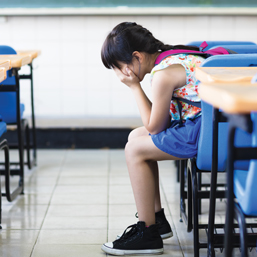
You never know how much of an impact your actions can have on someone. Something you say or do can significantly change the outcome of a situation.
A few years ago, I received a Facebook message from a guy I went to high school with. As soon as I saw his name, I was curious (and a bit surprised) to be hearing from him, knowing that we graduated from high school almost 17 years ago. I opened his message that read: “I wanted to thank you. I’m not sure if you remember, but you walked by me one day at school when I was sitting by my locker, and you smiled at me and said ‘hi.’ You asked how I was doing and genuinely cared. That was a really hard day for me, but you made it much better. You made a big difference. Thank you.”
I was stunned to receive such a lovely message and learn how much my actions positively impacted his day and possibly even his life, knowing he had messaged me about it 17 years later. I reflect on this experience often and am grateful for it.
I have told my daughter, who is in Grade 2, this story a few times since she started elementary school. In Grade 1, she would come home and tell me how a few girls she was hanging out with didn’t let another girl play with them. I could tell she knew that was wrong and it felt bad to exclude someone, so we talked about it. This is when we started talking regularly about including others and why it is important.
Why is including others important? It is important because every person deserves to feel like they belong to a group or community. When we feel connected to others and accepted, we can be our most genuine selves.
One day, my daughter talked about a boy in her class who was rude and told me the things he said that bothered her. This was an opportunity to teach her that some children are better at making friends right away than others, and that some children haven’t learned these skills yet. I challenged her to be nice to him and to get to know him because maybe deep down inside, all he wanted was to have a friend and feel like he belonged.
I believe the act of including others takes confidence, bravery, and leadership. Encouraging your child to use their voice and actions to help others will help build your kid’s confidence and leadership skills.
Your kid needs your help to validate their feelings and provide opportunities to practice doing the right thing. As a caregiver, it is important to explain why including others is important and then identify how to be inclusive.
When my daughter and I talked about actions that she could do to be inclusive, we came up with the following:
Once we came up with a list of actions, it was a lot easier for my daughter to gain confidence and understand what she needed to do.
In my experience, using personal stories, books, and hypothetical scenarios helps teach empathy and the importance of including others. Unfortunately, most of us have had an experience of being excluded at some point in our lives. Although it may be difficult, try and talk about that experience, explain how you felt, and what you needed in that moment.
I ask my daughter open-ended questions like, “If you ask someone to play and they say no, how would that make you feel?” When you give your child the chance to think critically about a situation and come up with a solution or an answer on their own, you are empowering your child to develop critical social skills, such as problem-solving, empathy, and cooperation that will help them become successful in life.
The more you talk to your child about including others, the more likely your child will be able to develop the skills to be inclusive. And the more you can be a positive role model, including others in your life, too, the more likely your child is to include others in theirs.
Your actions can turn someone’s hard day into a better day - a smile, helping hand, or connection can significantly change a situation. Never forget the impact you can have on others. Never underestimate the impact you have on your child. Start the conversation early.
Jen is the co-owner of WordPLAY Consulting Inc. and a Recreation Program Specialist with The City of Calgary. She has three children and enjoys exploring the outdoors with her family. Want to create more connections across your education, sport, or recreation organization? Visit wordplaycanada.com. Feeling Social? Follow on Instagram.
Calgary’s Child Magazine © 2024 Calgary’s Child